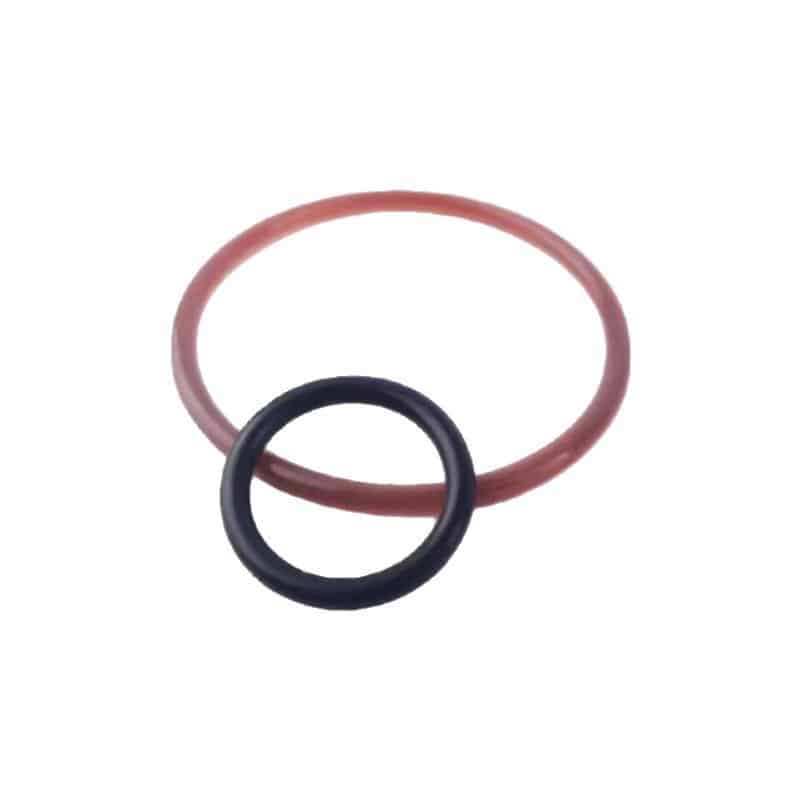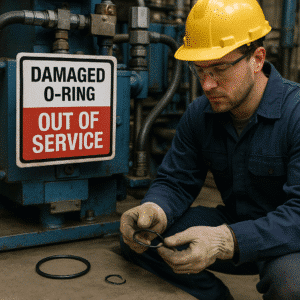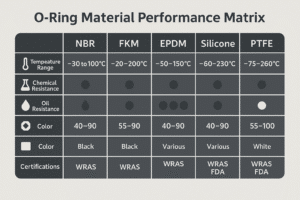Hydraulic leaks in excavators are a costly problem. I’ve seen firsthand how the right seals prevent downtime and extend machine lifespan.
Excavator hydraulic seals are essential for maintaining system pressure, preventing leaks, and protecting cylinders from wear and contaminants.

Let’s break down how to choose the right seals for your excavator.
Why Are Hydraulic Seals Critical for Excavator Performance?
Hydraulic seals:
- Prevent fluid leaks, maintaining pressure
- Block dust, debris, and water ingress
- Reduce wear & friction in cylinder components
- Ensure smooth, reliable machine operation
For sealing basics, read our Leitfaden zur Funktionsweise von O-Ringen.
Which Hydraulic Seals Are Used in Excavators?
| Dichtungstyp | Funktion | Am besten für |
|---|---|---|
| Kolbendichtungen | Stop fluid bypassing piston | High-pressure lifting/digging |
| Stangendichtungen | Prevent rod-end leakage | High-temp & aggressive fluids |
| Wischerdichtungen | Clean rod surfaces | Muddy, dusty job sites |
| Verschleißringe | Prevent metal contact | High-load lateral support |
| O-Rings & Backup Rings | Static sealing support | Cylinder internals |
Erkunden Seal Kits for Cylinders für Baggeranwendungen.
What Materials Are Best for Excavator Hydraulic Seals?
| Material | Temperaturbereich | Beste Verwendung | Vorteile |
|---|---|---|---|
| TPU | -40 °C bis 100 °C | Stangen- und Wischerdichtungen | Flexible, wear-resistant |
| NBR | -30 °C bis 110 °C | General seals | Cost-effective, oil resistant |
| FKM | -20 °C bis 200 °C | High-temp sealing | Hitze- und Chemikalienbeständigkeit |
| PTFE | -200 °C bis 260 °C | Rod & piston seals | Extreme durability, chemical proof |
| POM | -40 °C bis 120 °C | Verschleißringe | Hohe Festigkeit, geringe Reibung |
✅ Tipp: For excavators, TPU & PTFE offer the best balance of wear resistance and chemical durability.
Wie misst man Hydraulikdichtungen für Bagger?
Correct sizing is key to leak prevention:
- Measure Inner Diameter (ID)
- Measure Outer Diameter (OD)
- Measure Cross-Section (CS)
| Dichtungstyp | AUSWEIS | OD | CS |
|---|---|---|---|
| Stangendichtung | 50 mm | 60 mm | 5 mm |
| Kolbendichtung | 75 mm | 85 mm | 7 mm |
| Wischerdichtung | 90 mm | 100 mm | 6 mm |
Benötigen Sie Sondergrößen? Probieren Sie unsere O-Ring-Maker-Werkzeug.
Common Hydraulic Seal Failures & How to Prevent Them
| Fehlerursache | Verhütung |
|---|---|
| Übermäßige Hitze | Use FKM/PTFE for high-temp zones |
| Contaminants | Maintain wiper seals, replace as needed |
| Poor Installation | Always use seal installation tools |
| Fluid Incompatibility | Select chemical-resistant materials |
| Wear & Aging | Regular inspections, scheduled replacements |
Unser Seal Failure Guide covers prevention in detail.
Why Upgrading Excavator Seals Saves You Money
- 70% of hydraulic failures are seal-related
- Poor seals lead to oil leaks, loss of power, and costly downtime
- Upgrading to high-performance TPU & PTFE seals reduces maintenance and increases machine lifespan
For heavy-duty sealing, check Hydraulic Seal Solutions.
Where to Get Reliable Excavator Hydraulic Seals?
Hengoseal offers:
- OEM-compliant excavator seals
- High-performance TPU, FKM, PTFE materials
- Fast delivery, no MOQ
Explore top products:
📩 E-Mail: [email protected]
📞 WhatsApp: +86 17622979498
Abschluss
Choosing the right hydraulic seals is essential for excavator performance and longevity. Invest in high-quality TPU and PTFE seals to reduce downtime and maintenance costs.
Get Excavator Seals That Last – Contact Hengoseal Today
📩 E-Mail: [email protected]
📞 WhatsApp: +86 17622979498
Related topic
How to Choose Hydraulic Seal Kits by Size
Common Hydraulic Seal Failures & Prevention
How to Reduce Downtime with Better Seal Selection


